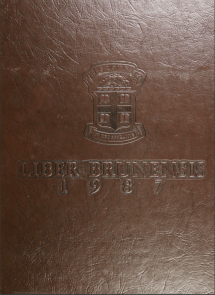Abstract
This interview with members of the Brown University class of 1987 encapsulates the undergraduate experiences of Carol M. Snow, Kim S. Reuben, Mary Lou Jepsen, Valerie T. Tutson, Trinita E. Brown, Baishali Rinku Sen, Stephanie L. Grace, Rebecca M. Zeigler, and Pamela D. Gerrol, at their 25th reunion.
The interviewees begin by briefly sharing personal background information and then explaining what drew them to Brown. They go on to describe their geographically and academically diverse high school experiences and whether or not they felt academically prepared for Brown during their first year. Throughout this interview, the interviewees discuss the nature of the open curriculum, which does not require any core courses, as well as how it shaped their educational, professional, and personal lives. 1984 through 1986 is recognized by the group at the most active time for protests on campus. Issues included racial and gender politics as well as war.
The interviewees give perfunctory mention to many of the demonstrations and issues on campus but they emphasize that this activism is a deep rooted and valuable aspect of Brown’s history and their experiences. There is a lighter conversation about using nascent computer systems and email, having access to telephones in their personal rooms, and the university’s post office serving as the center for communication.
The interview concludes with a discussion about Brown extending “need-blind” admissions – a policy in which Brown University does not consider an applicant’s financial situation when deciding admission – to international students and with the alumni encouraging future students to continue the tradition of activism on campus and volunteerism within the community.
Recorded on May 26, 2012 in Pembroke Hall, Brown University, Providence, RI.
Interviewed by Wendy Korwin
Suggested Chicago style citation: 25th Reunion, class of 1987. Interview. By Wendy Korwin. Pembroke Center Oral History Project, Brown University. May 26, 2012.
Biography
The Brown University class of 1987 was politically and socially active for several years and was able to enjoy a more relaxed senior year. The theatre produced plays such as Desdemona, Othello, and The Slab Boys. Naked students covered themselves in mud and walked around the Green as performance art. The Third World Center opened its doors as a gathering place for students of color to build relationships and enact change. Finally, President Howard Swearer implored graduates to continue their relationships with the university “to keep it strong, helping it to play its part to serve the larger community.”
